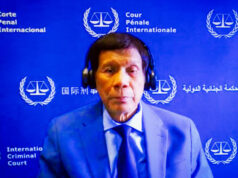THE DEPARTMENT of Agriculture said Vietnam, one of the country’s key sources of rice imports, has pledged to support the rehabilitation of war-ravaged Marawi City and initially donated 4,000 bags of rice.
In a Facebook post, Agriculture Secretary Emmanuel F. Piñol said Vietnamese President Tran Dai Quang made the commitment to President Rodrigo R Duterte during their bilateral talks on the sidelines of the 25th Asia-Pacific Economic Cooperation forum in Vietnam last week.
In turn, Mr. Duterte has vowed to work on the rescue of Vietnamese sailors abducted by the bandit group Abu Sayyaf in southern Philippines as well as the release of Vietnamese fishermen who were caught by the Philippine Navy poaching in the country’s fishing grounds.
Last Friday, three Vietnamese sailors held for eight months by Islamist gunmen were rescued by soldiers in the southern Philippines in the latest operation against the kidnap-for-ransom militants, the army said.
The sailors were found in the southernmost island group of Tawi-Tawi along with the body of another Vietnamese seaman who had died in captivity from an illness, regional military commander Lieutenant General Carlito G. Galvez, Jr. said.
“President Quang also assured President Duterte of his country’s support in its agricultural development initiatives. He also said that Vietnam remains committed to supply the Philippines rice requirements,” Mr. Piñol said in his post.
The Philippines imports at least 5% of its rice needs from Vietnam and Thailand.
Vietnam grows three rice crops annually. About a third of its production is shipped mainly to the Philippines, China and Indonesia.
The Vietnamese sailors were among the crew of a cargo vessel captured in February in the seas off the southern Philippines and held by the Abu Sayyaf, an Islamic extremist group blamed for kidnappings, piracy and bombings in the area.
Galvez said the Abu Sayyaf are still holding a number of Filipino and foreign hostages including Ewold Horn, a Dutch bird-watcher abducted in 2012.
PNG
Despite being short from a 100% self-sufficiency level, the Philippines has recently offered its rice technology to develop Papua New Guinea’s (PNG) rice industry, according to Mr. Piñol.
The move seeks to gain the Oceanian country’s leniency toward Philippine fishing companies amid the former’s demands for foreign firms to process all their tuna catch in its ports.
The PNG’s proposal is seen to depress the local tuna fishing industry as bulk of the country’s tuna production, sourced from the Western Pacific, is processed in the plants of General Santos City.
The Agriculture chief said he will deploy in December this year soil and irrigation experts to PNG to conduct initial tests and surveys to develop its rice farms, as well as its coconut industry. — Janina C. Lim with AFP



